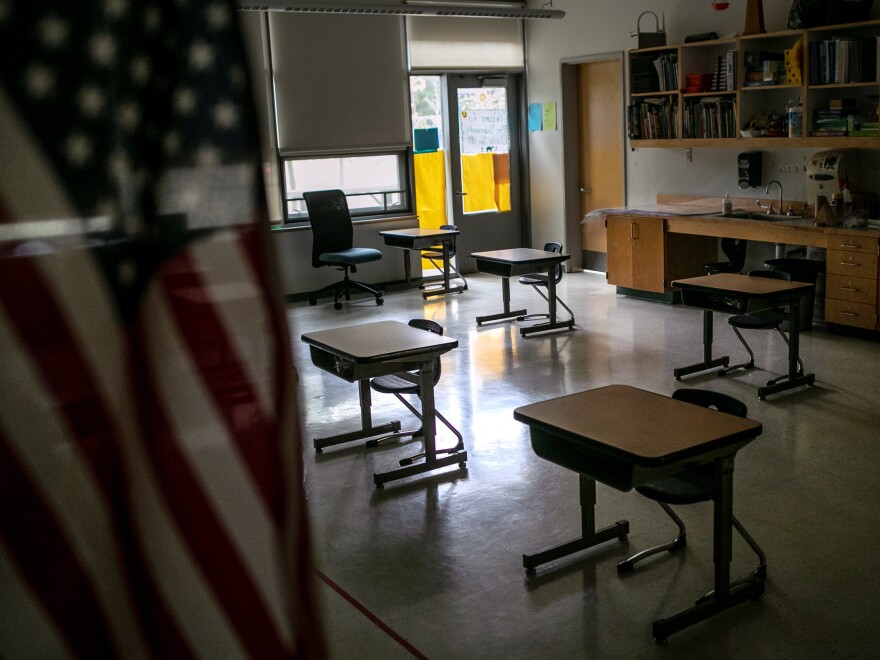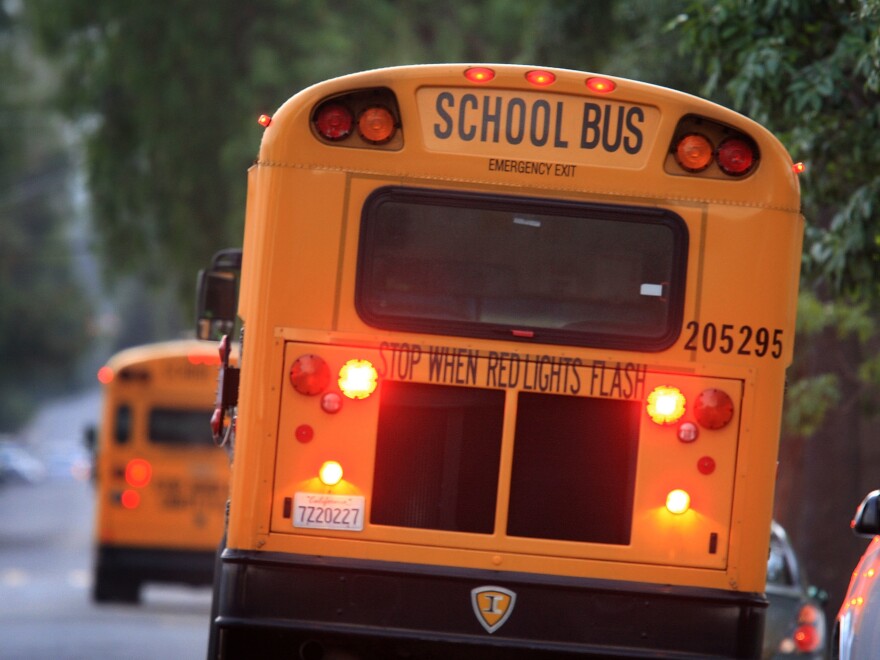It's a new school year and Jake Miller is not setting up his classroom in central Pennsylvania. He's not getting to know a new group of eighth-graders in his social studies class. After 15 years of teaching, he quit.
"I was accused of teaching critical race theory when I taught about how the Civil War was fought over racism and slavery," he said.
A couple of parents complained but weren't satisfied with the school board's answer.
"So they took it to a state representative who has used this as a dog whistle," he said.
It was all just too much, Miller said. He can't teach the Civil War without teaching about racism and slavery. But that incident wasn't the only thing that pushed him to leave.
"There were other moments prior to that," he said. "That just seemed to be the cherry on top."
There was the shortage of substitute teachers that made it hard to take time off to be there when his kids were sick. The low pay. The lack of respect from parents and politicians; a lack of resources; and, of course, the pandemic.
"There's been an attack on education for quite some time," Miller said. "The pandemic was just a weight too heavy. That was the albatross that pulled me under. And I knew that I needed to pivot."
Now he's a business consultant making 50% more than he did as a teacher.
Pennsylvania's Department of Education says the shortage is real as teachers like Miller leave. The spokesman has said they need thousands of new teachers and educators in other roles in the next three years or the problem could become chronic.
Other districts in states around the country are also scrambling to find and keep enough teachers to lead their classrooms as educators deal with burnout.

Teachers are also facing some unprecedented challenges: school board meetings that devolve into chaos over COVID policies; battles stemming from a politicized and misinformed panic over critical race theory; book banning; and a call to arm teachers in the face of gun violence.
Educators are on the front line of these societal fractures that can feel scary.
Miller said he's not sure he'll ever go back to education.
"To be honest, it's going to take teachers being treated like professionals, to have their dignity back, and for the public to rally behind them for folks like myself to consider it," he said.
Expected to do more, without support
Teachers across the country are making similar calculations as Miller.
Last year, Alexander Calderon's colleague quit suddenly. Overnight, he went from being a seventh-grade English language arts teacher to also being the social studies teacher.
"I felt like there was little to no support in terms of understanding this new curriculum," Calderon said. "I was really at my breaking point to the point where I was thinking about just leaving."
So he opened up the notes app on his phone and started writing a list.
Pros of the job: pay wasn't bad comparatively; his colleagues were supportive; he wanted to be there for his students.
Cons: very little support from the administration; he was doing the job of two teachers; school morale was terrible; and he was watching one teacher after the next leave.
Even though his cons list was slightly longer, this week Calderon started a new school year teaching both English language arts and social studies. His list is still saved on his phone.
"The kids are my No. 1 priority," he said. "Seeing what the kids' interests are and getting to know them as people is what ultimately drove me to stay."
He also said he's the only Spanish speaker on staff at his middle school. He recalls when a student — originally from Nicaragua — enrolled. He watched the boy's mother struggle to understand the system and to communicate.
"It made me think of my own mom struggling through the American education system," he said.
Calderon stepped in to help. It's another reason he won't quit.
"I felt that I was kind of morally obligated to stay," he said.
Teaching angry, but with love
Then there are the teachers who plan to stick it out no matter what, like Eric Hale. He's a first-grade teacher in the Dallas Independent School District.
In 2021, he was named teacher of the year for the entire state of Texas, the first African American man to win the honor.
"I got to meet these phenomenal educators that represented their state and we got to meet the president. It was a whole yearlong bonding experience," he said. "Out of my crew, only me and the state teacher of Illinois are still actively in the classroom."
He said he knows why they left.
"A lot of them, especially the teachers of color, got tired of fighting a system that necessarily wasn't designed for people that look like me and the kids that I serve to be successful," he said. "They got tired of the disrespect of the profession and most importantly, they got tired of the lack of compensation."
But when asked if he would ever leave, Hale said no.
"Because, I'm in a position and I've been blessed that I'm changing the face of education," he said.

Growing up as a Black student from a poorer neighborhood who didn't have a support system, Hale didn't have any teachers who looked like him — no teachers who truly understood his needs.
"So I teach angry. I'm chasing the ghost of the teacher that I wish I had when I was a child," he said.
He remembers having to go to churches for meals because his family couldn't always afford food. He didn't have a support system at home, and he couldn't find it at school either.
"I grew up being abused and in trauma in a neighborhood that was generationally underserved," he said. "So, sadly, I didn't have any great teachers. I just had one who made a difference."
Now, he is that teacher every day in his classroom of first-graders, where many of his students live in poverty and the school just doesn't get the books and equipment that public schools in richer areas get.
"I teach in the same type of neighborhood that I grew up in, and so I fight for these kids because I know the potential," he said. "I'm a firm believer of some of the brightest minds come from the darkest places."
Meanwhile, he said, he's been watching this uproar over critical race theory around the country. Teachers can barely afford the resources for their own curriculum, he said, so it's laughable that they'd shell out money for a college curriculum.
"They're trying to criminalize good teaching," he said.
It's a political weapon, he said, to stop teachers like him. Teachers who think about the race, ethnicity and circumstances of each student they have and how to help them connect.
"I teach every child that I serve the Texas state curriculum. I add to that curriculum images in literature and in person to inspire them that they can be a doctor, a lawyer, a novelist, an author," he said. "By bringing people that come from the same areas that they come from."
"So because I'm African American, I have to do my research and find great leaders of Hispanic descent, because the population that I serve is mostly Hispanic. I wish that somebody would have brought a judge to the school. I wish that somebody would have brought a current congressman, a senator, the mayor. ... Representation matters."
Hale is a dapper dresser: an emerald green tie, a navy blazer, complete with a bright orange pocket square. In his classroom he has a DJ booth where he plays songs he's made. Each one is named for a student, the beats and melodies tailored to their personalities.
"Each song is special and unique, just like the kids," he said. "Because I sit at home and I say, 'Oh, man, Jaime is very active. His feet are always moving. So I like these drums. They have a little pitter patter.' So I'm able to describe the songs to them and it makes them feel so special and it makes them feel so loved."
It's what he would've wanted when he was a child. It's why Eric Hale teaches.
Jake Miller, who left teaching, said he taught because of one teacher who inspired him to be the first in his family to go to college.
Alexander Calderon teaches to be the bridge builder for students who need him in the public school system.
And all of them, whether they stay or leave, look to the future of education with hope.
"I have two young sons," Miller said. "So you better believe I'm darn hopeful that the education that they get is going to be as good, if not better, than the education that I received."
"I know there's always going to be teachers in the classroom that stick it out for the long run," Calderon said.
And Hale leaves very little to chance: "I pray and I write a plan. How am I going to fix this? Why wait for Superman when you've got a cape in the closet?"
They said the future is in these students. But what that future looks like depends, they said, on whether the educators at the front of the room feel valued enough to stay.
Copyright 2022 NPR. To see more, visit https://www.npr.org.



